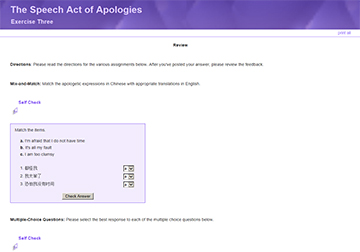Unit 3: Indirect Apology Strategies in Chinese (1)
Indirect apology strategies refer to those expressions that indirectly indicate the function of apologizing. In other words, indirect apology strategies do not contain the linguistic devices that explicitly indicate the force of apologizing (e.g., Sorry in American English and 对不起 in Chinese). Previous scholars have identified different types of sub-strategies (e.g., Blum-Kulak et al. 1989; Holmes, 1990; Trosborg, 1987) under this category. This unit introduces two types of indirect strategies that are commonly used in Chinese apologies, that is, explanation and taking on responsibility.
3.1 Goal of Unit 3
The goal of Unit 3 is to familiarize students with two types of indirect apology strategies that are commonly used in Chinese: explanation and taking on responsibility. After studying this unit, students are expected to be able to identify these two strategies in apologetic expressions in Chinese.
3.2 Explanation
Explanation is a type of commonly used indirect apology strategy in Chinese. Speakers apologize to hearers by providing explanations or accounts of the causes that have brought about the past offence. In particular, speakers tend to explain that the offence was caused by factors over which they had no control or frankly offer reasonable excuses to try to gain hearers’ understanding. This indirect strategy may often be used along with the direct apology strategy in Chinese, depending on specific interlocutors and situations. In addition, the expressions that offer explanations vary a great deal in Chinese, so any reasons, excuses, justification, or accounts of the causes relevant to the past offence would work. For example,
- 今天功课太多了,恐怕我没有时间。Jīntiān gōngkè tài duō le, kǒngpà wǒ méiyǒu shíjiān. (I have much homework to do today. I am afraid I do not have time.)
- 对不起,我的车坏了。Duìbùqǐ, wǒ de chē huài le. (I’m sorry. My car broke down.)
- 真不好意思,我早上起床晚了。Zhēn bùhǎoyìsi, wǒ zǎoshang qǐchuáng wǎn le. (I am really sorry. I got up late this morning.)
Thinking: Explanation is also a common apology strategy used in American English. Can you think of any examples that involve the use of this apology strategy in American English?
To learn more about the Chinese words and expressions in this section, please refer to the Glossary below.
| Word | Pinyin | Part of speech | English translations |
| 今天 | jīntiān | adv. | Today |
| 功课 | gōngkè | noun | Homework, assignment |
| 多 | duō | adj. | Many, much |
| 恐怕 | kǒngpà | adv. | I'm afraid, perhaps |
| 我 | wǒ | pron. | I, me |
| 我的 | wǒ de | adj. | My |
| 没有 | méi yǒu | N/A | Not have |
| 时间 | shíjiān | noun | Time |
| 车 | chē | noun | Car, vehicle |
| 坏 | huài | verb | Go bad, destroy |
| 早上 | zǎoshang | adv. | Morning |
| 起床 | qǐchuáng | verb | To get up |
| 晚 | wǎn | adv. | Late |
3.3 Taking on Responsibility
This indirect strategy refers to those expressions by which speakers admit to the fault or take on responsibility for the past offence. By recognizing the fault and expressing self-deficiency, speakers hope to ask forgiveness and thus try to placate hearers. This strategy may often be used with the direct apology strategies to intensify the force of apologizing in Chinese. For example,
- 这都是我的错. Zhè dōu shì wǒ de cuò. (This’s all my fault)
- 都怪我。对不起。Dōu guài wǒ, duìbùqǐ. (It’s all my fault. I’m sorry.)
- 对不起,是我太笨(bèn, clumsy; stupid)了。Duìbùqǐ, shì wǒ tài bèn le. (I’m sorry. I’m too clumsy.)
Thinking: Taking on responsibility is also a common apology strategy used in American English. Can you think of any examples that involve the use of this apology strategy in American English?
Review
To review the above information, please click on the Review link here.
